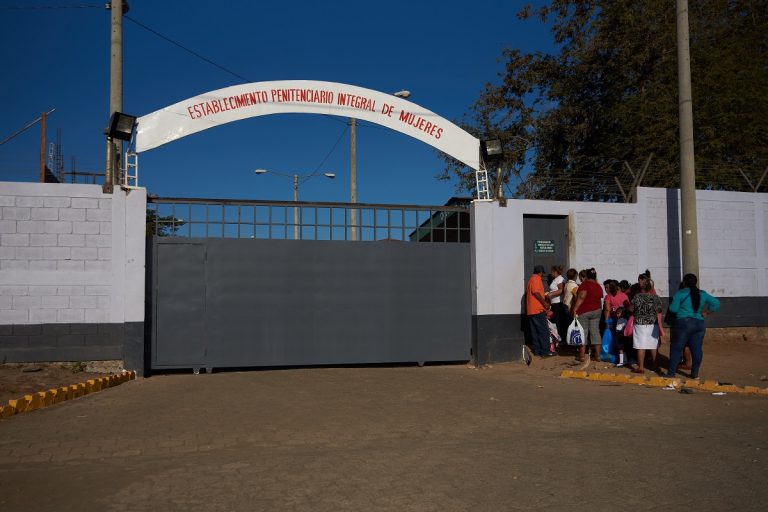23 de septiembre 2023

Children of Exile: The Births “Sowing Hope” in the Camp of Nicaraguan Farmers

PUBLICIDAD 1M
PUBLICIDAD 4D
PUBLICIDAD 5D
The female political prisoners women’s prison are being held in isolation, without the right to sunlight in the yard or adequate medical attention

Relatives of the prisoners at “La Esperanza” line up to leave food packages to their family members. File photo: Carlos Herrera
The majority of the Ortega regime’s 16 female political prisoners being held at the “La Esperanza” Women’s Penitentiary in Tipitapa, have been on a hunger strike for the past ten days. They’re asking for prompt medical attention, access to quality drinking water, and the right to get sun in the yard.
Since entering the prison, the women have been subjected to isolation and poor conditions. They’re all in a maximum-security wing, with two or three sharing very small cells, according to information from opposition activist Ivania Alvarez. They aren’t allowed to purchase cold water at the prison canteen, hence are forced to drink warm water from the tap. They’re photographed each time they receive the medication their family members bring them, or when they receive the food packages relatives send. In addition, they’re not given access to quality medical attention,” Alvarez added.
The women also lack the right to recreational activities or unsupervised visits. A source close to the political prisoners told Confidencial that this hunger strike is the only recourse they have to express “the desperation of being there,” which especially affects the women political prisoners who have young children.
“We’re in a living death,” one of these prisoners told the anonymous source. Meanwhile, relatives of fifty-two-year-old Olesia Muñoz, a well-known soprano from Niquinohomo, Masaya, told the platform Voces en Libertad [“Voices in Freedom”] that they were very concerned for her health. Olesia Muñoz was first imprisoned in 2018, then released in 2019 under the government’s controversial Amnesty Law, only to be rearrested in April 2023. Relatives fear that her reclusion in an extremely small cell, without light, could have serious consequences for her, especially since she’s been diagnosed with diabetes.
“The inmates have been in there for several weeks, breathing their same air and without the right to go out to the yard for sunlight,” Muñoz’ relative disclosed in a tone of desperation.
“They’re holding them in ‘the little tank,’ the cells where they send the common prisoners for punishment. It’s a terrible place. A pair of inmates nearly suffocated there – now imagine three people locked in one together. It’s a very dark place,” they denounced.
The women political prisoners are tired of their isolation and are demanding to be treated with the same rights the common prisoners have, Alvarez explained.
Up to now, further details of how the hunger strike is proceeding are unknown, as is whether there’ve been reprisals on the part of the prison authorities.
“That hunger strike is a positive step, because since they were taken to La Esperanza they haven’t been allowed to receive sunlight in the yard. They’re keeping them isolated from the common prisoners, because there were some who were helping them and showing solidarity with them. In the place they are now, they can scream, cry, and no one hears them,” the relative of Olesia Muñoz pointed out.
With the exception of 44-year-old Martha Candelaria Rivas, who’s being held in a Granada penitentiary, the rest of the women political prisoners are all in La Esperanza.
They are: Anielka Lucia Garcia, 27; Brenda Lee Baldelomar, 48; Nelly Griselda Lopez, 41; Olesia Muñoz, 52; Martha Lorena Centeno, 49; Ivonne Patricia Espinoza, 56; Hazel del Socorro Martinez; Melba Hernandez, 54; Adela Espinoza, Gabriela Morales, Mayela Campos, and another four whose names aren’t available. Their identities as political prisoners come from the August update of the Mechanism for the Recognition of Political Prisoners.
According to Muñoz’ family, the political prisoner is treated with scorn and discrimination by the prison authorities. While the other women political prisoners are given little pushcarts to help them when they receive their packages, Muñoz was denied that aid. She was forced to carry her food packages in her arms, but due to a lesion in one arm, she was unable to hold all the products. She ended up dropping her food and drink on the ground.
“No one helped her with the food package – not with a cart nor help from the prison guard. All her drink spilled, everything fell out of her arms. It’s disgusting, they’re inhuman,” the indignant relative complained.
Of the sixteen female political prisoners, four have already been sentenced for the crimes most commonly used to lock up political prisoners: “undermining the national sovereignty,” or “spreading fake news.” Another six of them are still being processed in the court system, and the legal status of the remaining six is unknown, due to the extreme secrecy the Ortega justice system imposes on these political “trials”.
Human rights advocates have pointed out that political prisoners turn to a hunger strike as a last resort for protest, in the face of constant violations of their rights. They do so knowing they’re risking their health and their lives. According to the “Mechanism,” in Nicaragua 89 people are confirmed political prisoners, but there could be more. There are many cases under investigation, and the designation depends on relatives who are willing to disclose information.
This article was originally published in Spanish in Confidencial and translated by Havana Times

PUBLICIDAD 3M
Confidencial es un diario digital nicaragüense, de formato multimedia, fundado por Carlos F. Chamorro en junio de 1996. Inició como un semanario impreso y hoy es un medio de referencia regional con información, análisis, entrevistas, perfiles, reportajes e investigaciones sobre Nicaragua, informando desde el exilio por la persecución política de la dictadura de Daniel Ortega y Rosario Murillo.
PUBLICIDAD 3D